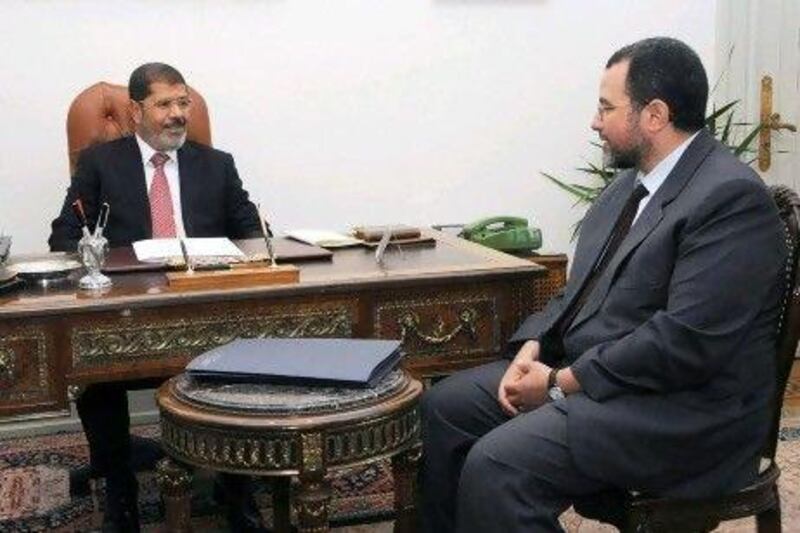CAIRO // Mohammed Morsi vowed to make a tangible impact within the first 100 days of taking office.
But the MorsiMeter, which tracks the president's follow-ups on 64 campaign promises, registers only one success so far.
The MorsiMeter, an online project by a non-profit group in Egypt, lists "media awareness campaigns and speeches in Friday prayers on sins people get when throwing rubbish in the street" as the success.
After 26 days as Egypt's president, the campaign promises that won him the spot seem to be undermining his leadership.
He has achieved little so far, except for high-profile visits to Saudi Arabia and Ethiopia, and Tuesday's announcement that he had appointed a little-known water and irrigation minister to the post of prime minister.
While violent street protests that have racked the country's political transition since Hosni Mubarak was forced to resign have dissipated, workers have shut down factories and Egyptians are becoming increasingly impatient over water shortages and the country's poor healthcare services.
But considering Mr Morsi's uncertain powers over Egypt after the Supreme Council of the Armed Forces (Scaf) made an 11th-hour power grab before he took office, it is no surprise that his most high-profile projects have been a street-cleaning programme and a call centre to receive complaints from citizens.
When he was inaugurated, many observers said he had won a "poisoned chalice", claiming he had taken the semblance of power but was set up to fail by the military-controlled government's unwillingness, or inability, to deal with the weakening economy.
The budget was already set in stone, giving the president no latitude to give priority to specific projects.
Even if he had obtained wider powers, it is an open question as to whether the Muslim Brotherhood's triumph in elections and focus on health and education would translate into successful governance in the world's most populous Arab country.
Egypt's scattered, yet significant secular political parties and authorities are hoping Mr Morsi does not keep up with the MorsiMeter.
That might translate into greater representation for their parties in new parliamentary elections scheduled for later this year if voters begin to equate Islamist politicians with failure.
One sign of this self-centred approach is the fact that Mr Morsi was left with no option for the new prime minister other than Hisham Kandil, a political unknown and professor of irrigation.
Mr Morsi has pledged a coalition government made up of representatives from across the political, religious and gender spectrum.
That gave rise to speculation that he would appoint a notable political operator as the head of his new cabinet, or at least a high-profile finance expert who could coordinate a recovery.
But analysts say it appears that none of the president's top choices wanted the job and he was forced to appoint the little-known technocrat instead.
Mr Morsi would have had a hard time finding a less well-known official than Prof Hesham Kandil.
A government of experts is nothing new to Egypt. But in this time of political turbulence, it may very well be the first sign of an unremarkable presidency.
"My fear is this will create many problems and the beginning of Morsi's legitimacy problem," said Mazen Hassan, a professor at Cairo University who is studying Egypt's political transition.
"During these volatile times in Egypt, we needed a political leader, not a professor.
"It seems like the president is having trouble convincing non-Muslim Brotherhood members of being associated with him."
The question is whether the Brotherhood and its political arm, the Freedom and Justice Party, can tackle Egypt's problems alone with the help of professors and scientists.
They have promised a renaissance for Egypt.
Anything less could leave their historic grasp on power slipping through their fingers.
Follow
The National
on
[ @TheNationalUAE ]
& Bradley Hope on
[ @bradleyhope ]






